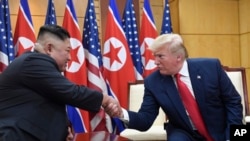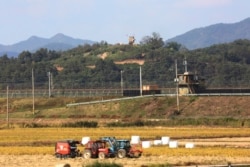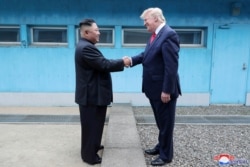There has been no substantial progress in U.S.-North Korea ties, a senior North Korean official warned Sunday, stressing that continued "belligerent" relations could lead to an exchange of fire "at any moment."
The statement from Kim Yong Chol, the country's former spymaster, appeared designed to further escalate pressure on the U.S. ahead of North Korea's self-imposed, end-of-year deadline to advance stalled nuclear talks.
North Korean officials have for months praised U.S. President Donald Trump and noted he continues to enjoy a close relationship with North Korean leader Kim Jong Un, even while slamming the rest of the U.S. administration.
U.S.-North Korea relations could have "derailed and fallen apart several times," but have been maintained because of the "close personal relations" between Trump and Kim Jong Un, Kim Yong Chol said in a statement published by the Korean Central News Agency.
"But there is a limit to everything," he continued. "The close personal relations ... are never a guarantee for preventing the DPRK-U.S. relations from getting aggravated."
The statement reiterated North Korea's end-of-year deadline, which U.S. officials have dismissed as arbitrary and unimportant.
The U.S. is "seriously mistaken," Kim Yong Chol said, if it shrugs off the deadline and exploits the Trump-Kim Jong Un relationship as a "delaying tactic."
Pressure tactic
Mintaro Oba, a former U.S. diplomat focused on the Koreas, said in some ways the statement was a "garden-variety North Korean pressure tactic."
"They want to put as much personal pressure on President Trump and time pressure on Washington, generally, as they can, while shaping a public narrative where the burden of proving good faith is on the United States," Oba said.
While the North Korean statement warned of an "exchange of fire," it still was much less aggressive than the language routinely used by North Korean officials as recently as 2017, during a period of heightened tensions.
"It certainly raises tensions above where they are now, but should be understood in the context of a history of habitually raising tensions for tactical gain and threatening, among many other things, to turn Seoul into a sea of fire," Oba said.
Trump-Kim still 'close'
The latest statement also still refrained from directly criticizing Trump, noted Soo Kim, a former CIA analyst and current North Korea expert at the Rand Corporation.
"But this time they've stepped it up on him, too," she said. By warning that the Trump-Kim relationship wouldn’t necessarily prevent ties from deteriorating, North Korea appeared to be sending a subtle threat.
"[It's] subtle, but in case Trump doesn't take these threats seriously, they're sending him another reminder," Soo Kim said.
A North Korean foreign ministry official said earlier this week that Trump and Kim Jong Un continued to have a "close" and "special" relationship and maintained trust with each other.
The U.S. and North Korean leaders have met three times since last June and exchange personal letters. Earlier this month, Trump also suggested he talks with Kim Jong Un on the phone.
But the two men's relationship has failed to transform broader U.S.-North Korea relations or secure progress on eliminating North Korea's nuclear weapons.
Pyongyang has appeared reluctant to talk with anyone other than Trump, leading some analysts to say the Trump-Kim relationship may actually be preventing more substantial, lower-level negotiations.
Talks stalled
Talks broke down in February when Trump walked away from a summit with Kim Jong Un in Hanoi, Vietnam, over disagreements on how to begin implementing denuclearization.
Following several months of little interaction, North Korea agreed to hold working-level talks in Stockholm, Sweden, apparently encouraged by Trump's suggestion of the need for a "new method" to the discussions.
But North Korea walked away after just one day of meetings. The North later said it had no intention of engaging in "sickening negotiations" until the U.S. took unspecified steps to withdraw its "hostile policy."
At their first meeting, held in Singapore last June, the two leaders agreed to improve U.S.-North Korea relations and to work toward the denuclearization of the Korean Peninsula. But the two sides have been unable to agree on what denuclearization means or how to begin implementing it.







